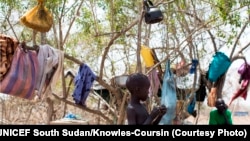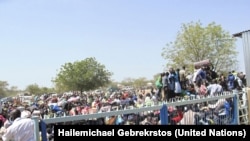At a compound in Bor, workers pound nails into wooden planks and iron sheets as they build a shelter for Joseph Chaar Anyuat and his family. It will provide shade on sunny days, and protection from downpours when it rains.
Anyuat is one of nearly two million South Sudanese who have fled their homes since this young country plunged into conflict nearly 11 months ago. Most are still living in U.N. protection of civilian sites, in refugee camps outside the country, or in makeshift shelters in South Sudan.
Anyuat went to northern Uganda at the height of the violence, but decided to return to the Jonglei state capital three weeks ago.
He's happy to be back home but memories of the fierce battle for control of Bor nine months ago still haunt him.
“All my houses were burnt, all my properties were stolen, my shop in town was damaged," he said.
"I will start my life from zero. I will succeed. If there is no war, I will succeed," he said.
Anyuat's family is one of 5,000 that have been registered as having returned to Bor by the South Sudan Relief and Rehabilitation Commission (SSRRC), a government relief agency that gives the returnees emergency food supplies and helps in the effort to resettle them.
I will start my life from zero. I will succeed. If there is no war, I will succeed.Joseph Chaar Anyuat, Bor returnee
Anyuat says he has not had any of the sorghum, oil and beans that some of the other returnees were given by the SSRRC.
But putting food in his belly is not his main concern, he says. Instead, he is concerned about security in Bor and other towns that people fled during the unrest. He says the government must ensure that displaced people, including about 2,000 Nuer civilians sheltering at the U.N. camp in Bor, must feel it is safe enough to return to their homes.
He yearns for a return to the days of relative tranquility in Bor, the days before South Sudan plunged into what some, including the ruling SPLM party, have called a civil war.
Bor saw some of the fiercest clashes during the conflict, and thousands of residents of the town sought shelter in the U.N. base.
In April, an armed mob forced entry into the U.N. compound in Bor, and began firing on the internally displaced persons sheltering inside the base, killing dozens of people. The United Nations condemned the attack as a war crime.
Insecurity a thing of the past
Ding Akol Ding, an advisor to Jonglei's caretaker governor, John Kong Nyuon, insists that the days of insecurity in Bor are a thing of the past.
Many residents who fled "have come back and they are now working and nothing has been reported since the time these people started coming back from the UNMISS compound," he says.
"There is no aggression. There is no attack on any individual. Security is stable for everybody who is in Bor town," he says.
But he acknowledges that many of the displaced in the UNMISS camp are still too fearful to return to their homes in the town.
"They feel that the situation is still volatile," he says.
"I am sure they will come out, all of them, because their number has reduced from 5,000 to 2,000, meaning 3,000 -- more than half -- have gone," he says.
The United Nations Office for the Coordination of Humanitarian Affairs (OCHA) says in its most recent report on South Sudan that there are around 2,700 people sheltering at UNMISS facilities in Bor.
It will take time for everyone to return home, Ding says, "because trust was completely lost between the communities.”
At least 10,000 people have died and about hundreds of thousands have fled their homes since South Sudan plunged into conflict last December.
Although rooted in a power struggle within the ruling SPLM, the conflict rapidly took on ethnic overtones, pitting member of the two largest tribes, the Dinka and the Nuer, against each other, the head of an African Union commission of inquiry, former Nigerian president Olusegun Obasanjo, told the U.N. Human Rights Council last month.
Attempts to reach a deal to end the war have been largely fruitless. A cessation of hostilities agreement signed by the government and opposition in January has been repeatedly violated.







